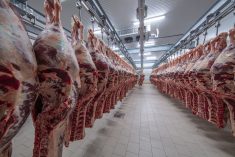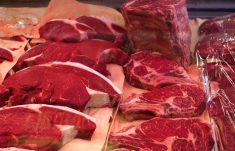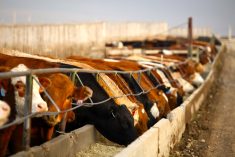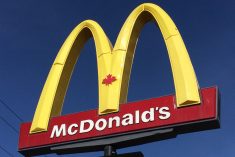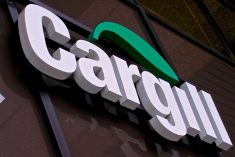UPDATED, Nov. 2 — A pilot program running through one of Canada’s biggest beef packing plants aims to test systems that can show consumers the exact path of their beef from ranch to restaurant — and reward cattle producers for their trouble.
Cargill on Wednesday announced a new year-long Canadian Beef Sustainability Acceleration pilot, with which it expects to put customers of its High River, Alta. beef packing plant “one step closer” to providing consumers with such information by the end of 2018.
Cargill’s Winnipeg-based Canadian arm said its new initiative will kick off this month, providing “significant” scale to track beef from operations that have been audited from “birth to burger” using the Canadian beef industry’s recently-developed sustainability standard.
Read Also

JBS profit falls amid still-challenging US market environment
JBS, the world’s largest meat company, reported a net profit fall in the third quarter in spite of a rise in global net sales amid a still-challenging beef market environment in the U.S., according to an earnings statement on Thursday.
The U.S. agrifood firm — Canada’s biggest beef processor — has capacity at High River to process up to 4,500 head of cattle per day.
The pilot program, including only Canadian cattle, is expected to both “incorporate, and explore” assorted new technologies, to “determine their long-term value.”
Among such technologies, Cargill mentioned DNA testing, as well as blockchain, an internet database tool considered to be well suited for secure food traceability.
“Ultimately, the intention is to create a process that is robust while still being practical, scalable and cost-effective,” the company said.
Beef customers taking part in the pilot so far include Loblaw, McDonald’s Canada and Cara Operations’ Swiss Chalet chain, Cargill said.
Cargill said its pilot will build on learnings from McDonald’s beef sustainability program, in which almost 9,000 cattle were tracked last year down the length of the supply chain.
The new pilot is also designed to provide a first-ever test for the standards and guidance developed by the Canadian Roundtable for Sustainable Beef (CRSB), of which Cargill is a founding member.
Using radio-frequency identification (RFID) tags, cattle will be tracked via the BIXS (Beef Info-Exchange System), starting when cattle producers tag them, through to processing at High River.
In the pilot, Cargill said, VBP+ (Verified Beef Production Plus) will be the first certification body used to audit cattle producers who choose to participate. VBP+, overseen by the Beef Cattle Research Council, is run in co-operation with provincial cattle organizations.
‘Financial credit’
A “unique” aspect of the pilot, Cargill said, will involve rewarding participating cattle producers “as a way to help offset the increased costs associated with implementing and running the pilot.”
Specifically, the company said via email Thursday, participation “may lead to a financial credit” to partly offset costs producers can incur in becoming VBP+ certified according to the CRSB framework.
To guarantee a financial credit, Cargill said, an eligible producer will have to make sure his or her cattle go through a “fully certified” supply chain — that is, from a certified cow-calf operation to a certified feedlot to a certified packer such as the High River plant.
Cargill said Thursday it’s still too early to say what the value of such a credit will be. However, the company said, the more producers who participate, the greater the chance that more cattle will go through a fully certified supply chain.
“This will increase the volume of beef from certified sustainable sources available to those customers who are funding the pilot, which thereby will increase the credits that are available for distribution back to the supply chain.”
“We want this to be the best possible model for beef from verified sustainable sources in Canada, and we are energized about the potential benefits for stakeholders across the entire beef value chain,” Gurneesh Bhandal, Cargill’s beef sustainability manager in Toronto, said in Wednesday’s release.
“Any technology that could potentially make this process better for the Canadian beef value chain will be considered,” she said.
‘Thirst’
The sustainability pilot, she added, “will help create the infrastructure needed to implement (CRSB)’s standard in our supply chain, providing our customers and consumers with an increased level of trust in the beef they purchase and eat.
“Ever more frequently, our retail and restaurant customers ask us questions about where Canadian beef comes from and how the cattle are raised,” Bhandal said, noting Cargill’s consumer research points to “a thirst for this type of information.”
Making financial credits available to producers shows the value that Cargill’s beef customers place on the development of this kind of certified sustainable beef supply, the company said.
While those retail, dining and foodservice customers can’t yet make any “consumer-facing claims” for their sourcing through this pilot, “they are still willing to fund the project and thank producers and processors for our willingness to kick-start this effort,” Cargill said.
The early financial credits for producers will be “modest,” Cargill said, but “it is up to us within the beef industry to accept this call to action from our customers and build a supply chain that will drive more long-term value for everyone in the chain through increased consumer trust in, and purchases of, Canadian beef.”
CRSB on Saturday will wrap up its latest public consultation period on sustainability indicators for the beef processing sector. The roundtable expects to launch its Verified Sustainable Beef Framework in December. — AGCanada.com Network






